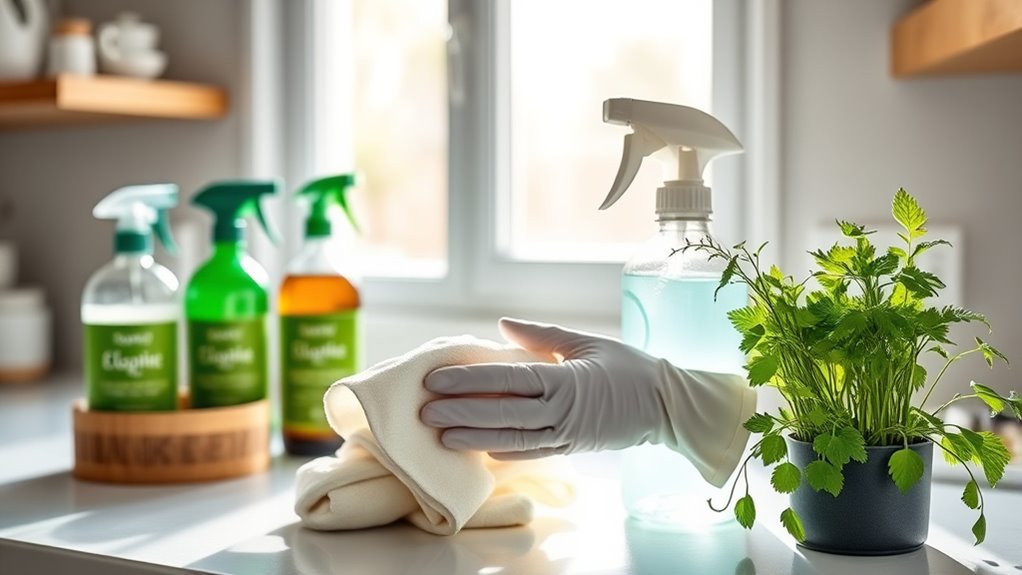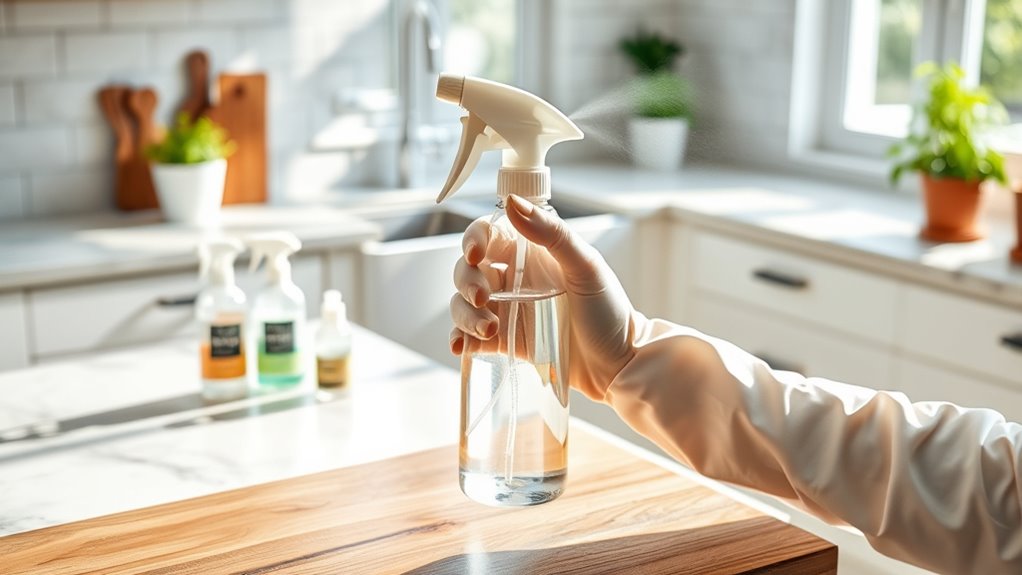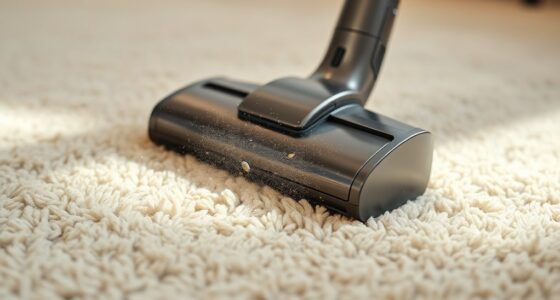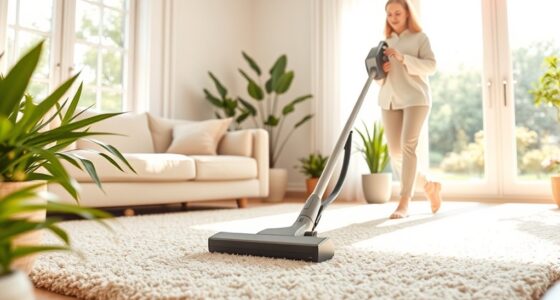Minimizing chemical exposure when cleaning is essential for a healthier home. Start by using natural cleaning ingredients like vinegar, baking soda, and essential oils that effectively tackle dirt and grime without harsh chemicals. Always check product labels for harmful substances and opt for safer alternatives. Homemade solutions not only save money but can be customized to suit your needs. If you want to explore more tips and techniques, there’s plenty more to discover!
Key Takeaways
- Choose natural cleaning products with simple ingredients to reduce harmful chemical exposure in your home.
- Read labels carefully to identify and avoid synthetic fragrances, dyes, and preservatives in cleaning supplies.
- Create your own cleaning solutions using household ingredients like vinegar, baking soda, and essential oils for a safer alternative.
- Use vinegar mixed with water as a versatile all-purpose cleaner to minimize chemical use.
- Incorporate essential oils to enhance cleaning efficacy and provide natural antibacterial properties without harsh chemicals.

When you clean your home, it’s essential to minimize chemical exposure to protect your health and that of your family. Many traditional cleaning products contain harsh chemicals that can lead to respiratory issues, skin irritation, and other health problems. By shifting towards natural cleaning methods, you not only create a safer environment but also promote better air quality in your home. You might be surprised to learn that effective cleaning can be achieved with simple ingredients you probably already have in your kitchen.
Start by embracing ingredient awareness. Before you reach for that all-purpose cleaner, take a moment to read the label. Many products tout their effectiveness but hide harmful substances in their ingredient list. You’ll find that many synthetic fragrances, dyes, and preservatives can be detrimental to your health. Instead, look for products that use natural ingredients or, better yet, make your own cleaning solutions using common household items like vinegar, baking soda, and essential oils. These natural options are not only safer but often more effective at tackling dirt and grime.
Vinegar, for example, is a powerhouse when it comes to cleaning. Its natural acidity cuts through grease and eliminates odors, making it an ideal choice for kitchen and bathroom surfaces. When using vinegar, you can mix it with water to create an effective all-purpose cleaner. Adding a few drops of essential oils can enhance the scent and provide additional antibacterial properties. This way, you get a clean home without exposing your family to harmful chemicals.
Baking soda is another fantastic natural cleaning agent. Its gentle abrasiveness makes it perfect for scrubbing surfaces without scratching them. You can use it to tackle tough stains in your kitchen or bathroom. A simple paste made from baking soda and water can work wonders on sinks, tubs, and even stovetops. Plus, it’s safe for both kids and pets, giving you peace of mind while you clean.
As you adopt natural cleaning methods, you’ll find that staying aware of the ingredients in your cleaning supplies is vital. It empowers you to make informed choices that prioritize your family’s health. By committing to ingredient awareness and natural cleaning, you create a cleaner, safer home. Each small change you make can lead to significant improvements in your home environment, so start today and enjoy the benefits of a healthier living space. Additionally, color accuracy in your choice of cleaning products can enhance the overall visual cleanliness of your home.
Frequently Asked Questions
What Are Natural Alternatives to Chemical Cleaning Products?
You can use plant-based cleaners and homemade solutions as natural alternatives to chemical cleaning products. For instance, mix vinegar and baking soda for a powerful all-purpose cleaner, or use lemon juice to tackle stains and odors. Essential oils like tea tree or lavender can enhance your homemade formulas, adding both cleaning power and a pleasant scent. These options are effective, eco-friendly, and safe for your home, giving you peace of mind while cleaning.
How Can I Safely Dispose of Leftover Cleaning Chemicals?
Did you know that improper disposal of cleaning chemicals can lead to contamination of water supplies, affecting millions? To safely dispose of leftover cleaning chemicals, follow these disposal safety tips: Never pour them down the drain. Instead, check local guidelines for hazardous waste drop-off sites. Always keep chemicals in their original containers, and label them clearly to prevent spills. This guarantees chemical spill prevention and helps protect your environment and community.
Are There Specific Cleaning Products to Avoid for Sensitive Skin?
Yes, you should avoid cleaning products with harsh chemical ingredients, as they can cause skin irritants and allergic reactions. Look out for products containing bleach, ammonia, or synthetic fragrances, as these often trigger sensitivity. Instead, opt for gentle, natural alternatives that are fragrance-free and free from harmful chemicals. Always read labels, and consider patch testing new products on a small area of your skin before using them widely. Your skin will thank you!
How Often Should I Ventilate My Home When Cleaning?
You know that feeling when you open a window after a long drive, letting in fresh air? That’s what you want while cleaning. Aim to ventilate your home for at least 15-30 minutes during and after cleaning. This air exchange helps with odor removal and keeps the air fresh. If you’re using strong products, consider doing it more often. Your lungs will thank you, and your home will feel revitalized!
What Protective Gear Is Recommended While Cleaning With Chemicals?
When cleaning with chemicals, it’s vital to wear protective clothing like gloves, long sleeves, and pants to shield your skin. Eye protection, such as goggles or safety glasses, is important to prevent splashes from harming your eyes. Make sure your clothing is made from materials that resist chemical penetration for added safety. Always read the labels on your cleaning products for specific recommendations on protective gear to guarantee you’re fully protected during your cleaning tasks.
Conclusion
As you navigate the cleaning jungle, remember that every choice you make is like picking the right path through the dense foliage. Opt for natural, eco-friendly cleaners that act as gentle guides, steering you clear of toxic traps. Equip yourself with tools that protect both your health and the environment, allowing you to emerge from your cleaning adventure unscathed. By minimizing chemical exposure, you’re not just tidying up; you’re cultivating a safer, greener habitat for everyone.









